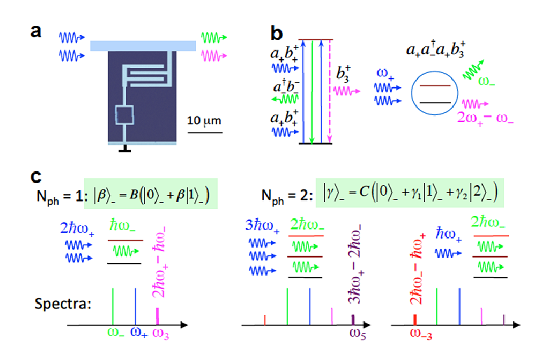
Vladimir N Antonov
Royal Holloway University of London, UK
Moscow Institute of Physics and Technology, Russia
Title: Quantum wave mixing and resolving photonic classical and non-classical coherent states
Biography
Biography: Vladimir N Antonov
Abstract
Superconducting quantum systems- artificial atoms are building blocks of novel on-chip quantum electronics, which utilize the quantum nature of electromagnetic waves. Particularly, single atoms can create and reveal quantized light states beyond classical statistics. In this work we demonstrate a novel fundamental physical phenomenon, the Quantum Wave Mixing (QWM), which is attainable only in the systems where light-matter interaction is arranged between an individual photons and a single atom. QWM reveals itself as an elastic scattering of coherent classical and non-classical photonic states of electromagnetic waves on a single artificial atom in a 1D space. We demonstrate two regimes of QWM, comprising different degrees of “quantumness". The most spectacular one is QWM with non-classical coherent states, exhibiting spectra of a finite number of narrow coherent emission peaks. The spectrum is a fingerprint of interacting photon states, where the number of positive frequency peaks (due to stimulated emission) always exceeds by one the negative ones (due to absorption). We also study four- and higher-order wave mixing of classical coherent waves on the artificial atom. In this case the time dynamics of the peaks exhibits a series of Bessel-function quantum oscillations with orders determined by the number of interacting photons.

Figure: a) A false colored SEM image of the device a superconducting loop with four Josephson junctions, behaving as an artificial atom, is embedded into a transmission line and strongly interacts with propagating electromagnetic waves. b) Four-wave mixing processes resulting in the single-phoon field creation at ω3=2ω+-ω-. In classical mixing, the process operators a+a*-a+b+3 come in pair with the symmetric one a-a*+a-b+3. In the mixing with non-classical states, the time symmetry is broken resulting in the asymmetric spectrum. c) Schematic representation of QWM with non-classical coherent states. Two sequential pulses of ω+. Single-photon, Nph = 1, state |β>- can only create a peak at ω3=2ω+-ω-. Two photon, Nph = 2, coherent state |γ>- results in creation of an additional; peak at 3ω+-2ω-. because not more than two photons can be emitted. An additional left-hand-side peak appears at 2ω--ω+ in this case.

